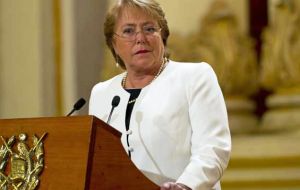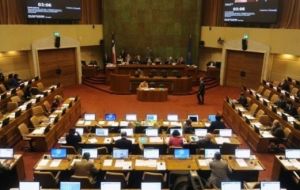MercoPress. South Atlantic News Agency
Chile approves free university education for 200.000 students, one of Bachelet's campaign promise
 “A short while ago it seemed impossible and unthinkable, but in 2016 thousands and thousands of young people can finally attend university without cost.”
“A short while ago it seemed impossible and unthinkable, but in 2016 thousands and thousands of young people can finally attend university without cost.”  With 92 votes in favor, two against and one abstention, the Congress approved the gratuity helping those financially unable to access higher education during 2016.
With 92 votes in favor, two against and one abstention, the Congress approved the gratuity helping those financially unable to access higher education during 2016. Chile’s Congress has approved a law granting free university education to many of the country’s students. The law was approved by both houses of the legislature last week before Christmas. The measure is a pillar of President Michelle Bachelet’s reform promises and is expected to aid about 200,000 students at state universities.
Students attending private institutions are also expected to join with some conditions. Annual secondary education costs in Chile range from US$6,000 to US$15,000. Many students take out loans or mortgages to pay their tuition.
After several days of tension due to a disputed decision by the Constitutional Court, the Chilean Congress gave the green light to the Short Law of free higher education.
The country’s president, Michelle Bachelet, said that common sense prevailed to approve the law granting free university education to young people from vulnerable sectors.
Bachelet said, “we have taken an important step today, a step that just a short while ago seemed impossible and unthinkable. In the upcoming year, thousands and thousands of young people can finally attend university without cost.”
“In 2016, thousands of young people will be able study for free. I want to thank all parliamentarians who supported the Government’s project,” the president added. The head of state noted that the promises made to families and students were fulfilled.
“We have made good on the promises we made and the words we spoke to the students and their families. It has not been easy, but thankfully common sense has prevailed,” she said just after she signed the decree on national television shortly after the bill was approved by both houses of Congress.
Starting this week, those from low-income families will have access to free education.
Bachelet explained that students who do not have access to free university education “will be able to obtain the existing government support: scholarships and credits, until we can expand the bill to all higher education.”
With 92 votes in favor, two against and one abstention, the Chilean Congress approved the gratuity helping those financially unable to access higher education during 2016.
“The fight for free, high-quality education has been given a big boost today, but it is merely one development and not the end by any means. We will continue pushing forward in the coming years so that Chile will eventually have a truly inclusive educational system, one where an individual’s intelligence and work will have the final say in their education and not the size of their family’s bank account,” Bachelet concluded.
Chile’s Constitutional Court had recently blocked a part of Bachelet’s proposal to provide free university education to half the country’s poorest students.
The court ruled that portions of the plan discriminated against students by forcing them to attend specific institutions to qualify for the benefit. The government then amended the US$765 million plan, which is included in its budget for 2016.
Controversy around the bill further escalated last week with the governing coalition divided on the fact that free access to education did not apply to at least three public universities, while private ones were included.
The government had explained that the three public universities fell short of the required four years of guaranteed accreditation, but Wednesday’s bill accommodates them.
“State universities are all included in the free-education bill, none will be treated differently,” said the Education Minister Adriana Delpiano.
By 2018, when Bachelet’s four-year mandate is set to end (in March), her government says that it will have 70% of students covered for free higher education. Finally, by 2020, the coverage for free university education is expected to become universal.




Top Comments
Disclaimer & comment rules-

-

-

Read all commentsI'm a great supporter of this.
Dec 28th, 2015 - 12:50 pm 0Universities should be enrolling students based on their ability to study and not ability to pay.
This is going to have some interesting and undesired consequences.
Dec 28th, 2015 - 01:29 pm 0The law in Chile requires that parents support a child until age 26 -- actually many are children long after that age, but that is another story -- if that child is going to school/university or something that could be contrived to be so. So “free university” really means “free ride until 26” for the current generation of overwhelmingly aimless cabros. And avoidance of maturity and responsibility just got a new contract. Watch as Chilean universities become choked with children studying art history, anthropology, and geography, for which there are no jobs in Chile except at Starbucks and Lomitos. Already chilean employers are saying that most uni titles are meaningless anyway. There was early on a proposal to limit “free university” to those studying in a select set of careers in which the country actually had potential needs and employment, for which the country would benefit in development and essential services, but that didn't satisfy the Socialists. Now chilean populism is trying to emulate the failures of its neighbour.
I really am conflicted about this. Developing countries need a more educated population but they also need to be able to pay for it.
Dec 28th, 2015 - 02:33 pm 0It is not as simple as comparing it to other countries because each country is unique. Chile is two countries - the rich and entitled and the poor that are climbing all over each other trying to be better than others. The two countries do not merge. To break this down needs to open up further education but it is incredibly expensive for the average Chilean family.
@2 You make a good point about the eternal students and an unwillingness to cut the cord. I cannot tell you how many 30 somethings I have met who have never had a real job and seem to lack ambition.
In the past Chileans from financially strapped families have relied on grants from places like the Pinochet Foundation or their parents taking out huge loans. It would surely be more successful if they persuaded companies needing graduates to grow to fund the further education (in return for tax breaks) and in return for a number of years service. Or for the government to fund doctors and teachers in return for a commitment of a number of years service in state hospitals/schools.
I think the government would be better served improving the education to 18. It is nowhere near the level attained at 18 in developed countries. Further education, whilst desirable is a privilege. It will lead to better paid jobs over a lifetime so why can't the student invest in their own future? Or as I have mentioned, get a future employer to invest? It is wrong to assert that not having free Uni merely promotes the separate rich vs poor societies because in Chile your name and who you know already guarantees the privileged a job no matter their education. They are a shoo-in to one of their family owned companies or one owned by a family friend.
I just do not see the government paying for students until they are 30/40 as a good return on their money. JMO
Commenting for this story is now closed.
If you have a Facebook account, become a fan and comment on our Facebook Page!